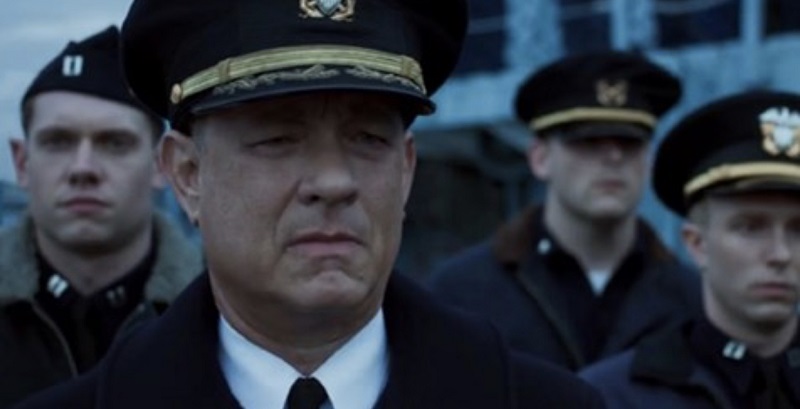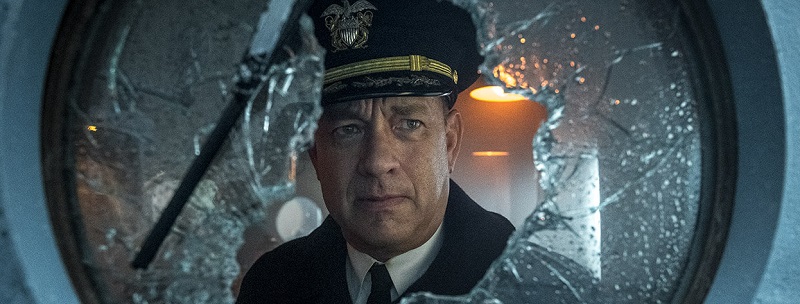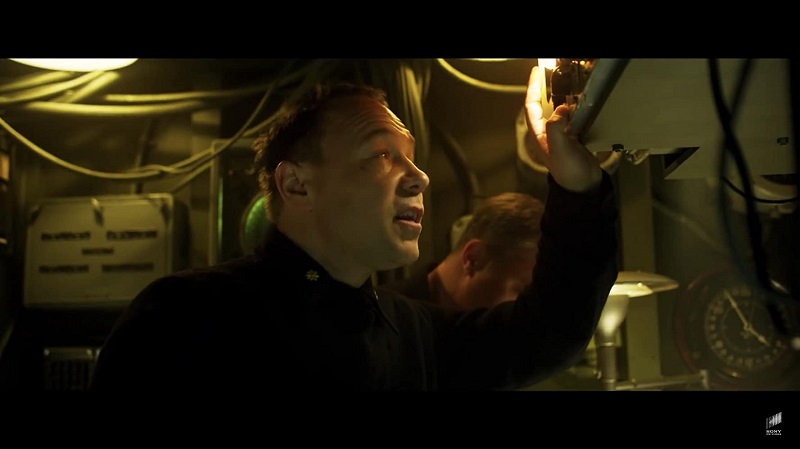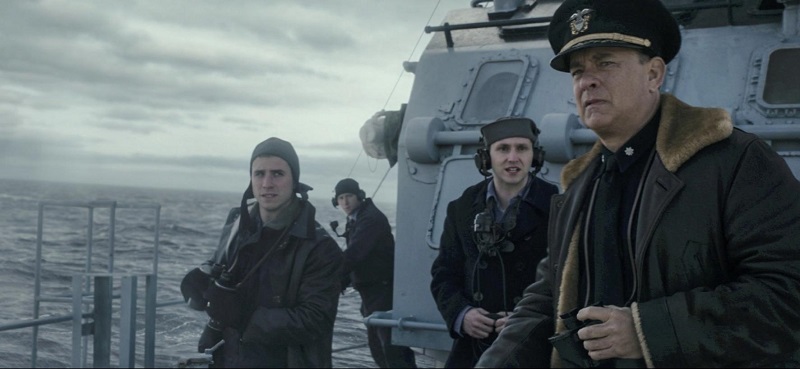Tom Hanks’ affection for the sacrifice and bravery of the United States military is long documented in his work but rarely has it felt so personal as it does in Greyhound. The film bows on Apple+ July 10 and tells the story of a Naval Captain fighting for the life of thousands under his command, but also the turning point of the war.

The Battle of the Atlantic was about as perilous of a journey as been previously undertaken in humankind. The U.S. led a coalition of international naval vessels, including England and Canada, escorted priceless supply ships bringing much needed supplies, weapons, and troops to the European theater of World War II. Thing is, making your way across the ocean is much like walking across a minefield on land. At any moment, under any swatch of ocean lay German U-Boats with their lethal brigade of attack methods. The jaunt took several days and for a large part of it, the Naval brigade was flying solo—there was no air support available until they got close enough to the British Isles.
Hanks is Captain Krause, and he is undertaking his first command. It’s 1942 and America is finally all-in on this global effort to stop fascism in its tracks and push it back into the dustbin of history. Our forces fought Japan in the Pacific and across Asia, while allied troops fought the Germans on the Atlantic, and across Europe and Africa. The key to victory in Europe was the supply chain. If thousands of giant ships cannot make it to the continent, forces would be fatally handicapped.
What’s astounding about Greyhound is, without ever leaving Hanks’ ship—or it even being talked about too much—the weight and gravity of this mission is immediately established. It is palpable. As each convoy ship is torpedoed are made into swiss cheese by those high powered weapons atop the U-Boat subs, it made Allied Forces weaker in the field. That heightened sense of impending doom meets unbridled American determination adds up to an incredibly taut thriller that never takes its foot off the breaks for the entire 90 minute run time.
Hanks also wrote the script for Greyhound, based on the novel by C.S. Forester, The Good Shepherd. Of course, the film’s moniker comes from Hanks’ ship. The book’s title really gave us a sense of how Krause approached his role on the Greyhound. Hanks’ character is indeed that, a shepherd who is charged with bringing his flock home safely. Given the peril of the waters of the Atlantic in 1942, that is almost an impossible task. In the hands of the right naval mastermind, one who is smart, informed and possesses priceless gut senses, the odds could, just possibly, be in your favor. After all, the only thing that rides on this mission is troops and the Allied brain trust. On the other end of this trip lies those who represent right, who are fighting those who embody all that is wrong.
It’s a tight script, without a single millisecond to waste. The actor has penned the ultimate love letter to the brave men who without a thought signed up to fight for freedom, specifically in this instance, the United States Navy. These guys are the best of the best and with Hanks’ Krause at the helm, each of the ships in the convoy has their most solid chance to live another day and watch the sunrise awake over the vast and glorious ocean.
The amount of research that Hanks had to do is mind-blowing. He not only had to create characters that pop off the screen and command our heartstrings simply through their actions until we “get to know them” as the film progresses. How he also mastered capturing the Naval lingo and strategy employed by a man of Krause’s caliber is pristine. One truly feels like you are on the deck of a U.S. naval warship in the midst of a multi-day fight for the collective lives of thousands upon thousands who sail behind the military convey. Each is also braving the horrors of the Germans to bring victory to Allied forces. Hanks knows his Naval terminology and of course the strategy that accompanies each one of those actions. There are also little things, such as the kind relationship he has painted with such touching brushes. One of those is Cleveland (Rob Morgan), who is tasked with bringing the Captain his meals, coffee, and anything else he requires. They have a great rapport and it’s always a nice respite from the bullets flying and torpedoes rocketing towards them. This relationship also illustrates how demanding this mission was for someone in command of such a naval brigade. He never gets the opportunity to eat because something vital always grabs his attention milliseconds after his meal arrived.

There is an aspect to the Krause characterization that brought the most human and humane elements to the Hanks character. It comes from the script he wrote, sure, but the way the thespian brings those emotions to life adds a piercing layer to Greyhound. Every time someone dies, or a legion of folks perishes, he feels it. Early on, those destroy a U-Boat and know they have because an enormous pool of fuel makes its way to the surface. His crew raucously celebrates! Krause always takes a moment, perhaps to pray for the lost souls, or maybe even to contemplate that crazy insanity of war.
The film features a few flashbacks to give our Krause a home life to “fight for,” in the form of some short scenes with Elizabeth Shue. She plays the woman who will be his wife, Evelyn. The sacrifices of so many are embodied in these scenes. Every single soul fighting for justice and against tyranny shared a similar bond with someone back home. There were people back in the States who were awaiting their return and years of life, liberty, and the pursuit of happiness. Hanks and Shue’s scenes are brief, but all that is required to add layers of emotive humanity to Hanks’ characters.
Supporting cast pulls their weight on this ship, but if we had to shine a spotlight on anyone, it would be Stephen Graham’s Charlie Cole. He is, in many ways, Krause’s right-hand man. As such, he has his captain’s best interests in mind, regardless of the situation. Yet, Cole does sometimes show hints of concern when Krause issues an under while being pursued by torpedoes or flanked by enemy submarines. It’s all achieved in his face. Still, he never says a word, unless he is sure that it can complement the order that his captain has issued. That is all expressed in Graham’s face and done so with such incredible authority.

One will emerge with an incredible sense of wonder and awe and those who serve in the military, specifically here the Navy. This is not new for America’s “Dad,” as he is known. Hanks’ longtime appreciation of our military and getting that onscreen dates back to Saving Private Ryan andproducing the HBO series’ Band of Brothers and The Pacific. This is the first time that he was able to pen put to paper and send out his own personal war story to the world. It was worth the wait.
When it comes to the battle sequences, they are harrowing. Hanks and director Aaron Schneider are a powerful tandem as writer/star and helmer. The performer always brings his A-game and has delivered a sizzling script for Schneider to showcase his innate talents of storytelling and framing action scenes with emotional beats to allow the audience to breathe.

The helmer’s sharp vision was honed as a cinematographer on dozens of projects. Schneider has a command of overall cinematic pacing and electrifying battle sequences, with many producing a visceral response. Greyhound may seem like another spoke in the wheel that is cinematic salutes to the Greatest Generation. Just when you think we don’t need another cinematic tribute to those brave souls of World War II, one experiences a film such as Hanks’ latest, and we’re left wondering what other stories about that war do we get to experience in the future?
Grade: A

